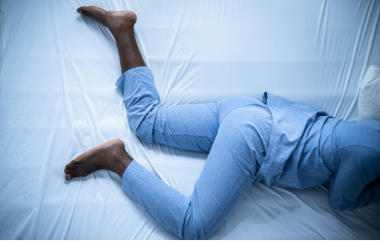Do you struggle to fall asleep because your legs feel twitchy or uncomfortable? You’re not alone. According to a recent survey by the American Academy of Sleep Medicine (AASM), 13% of Americans report they’ve been diagnosed with restless legs syndrome (RLS). With Restless Legs Syndrome Awareness Day on Sept. 23, it’s a great time to understand how RLS impacts sleep and health.
What is restless legs syndrome?
RLS is a neurological disorder that causes an irresistible urge to move the legs, often paired with uncomfortable sensations like twitching, aching or a crawling feeling. These symptoms usually begin in the evening or when you’re trying to relax in bed, but they improve with movement like walking, stretching or even massaging the legs.
However, many people don’t view these symptoms as serious concerns, so they wait years before seeking treatment for RLS.
How does RLS impact sleep?
Sleep is one of the pillars of good health, along with nutrition and exercise. But if you have RLS, getting enough quality sleep can be a challenge. The discomfort makes it hard to fall asleep and stay asleep.
When you lose sleep, it affects your day-to-day life. You might feel more irritable, struggle to concentrate and experience fatigue, all of which can lower your productivity. Over time, chronic sleep loss from RLS can impact your quality of life.
Mental health effects of RLS
The impact of RLS goes beyond sleep. The Patient ODYSSEY II Survey conducted by the RLS Foundation found that people with RLS experience depression and anxiety at four times the rate of the general U.S. population.
This connection between RLS and mental health makes it even more important to seek treatment early.
Don’t delay diagnosis and treatment
So, what can you do if you think you have RLS? The first step is talking to your health care professional. Early diagnosis and treatment are key to improving both sleep and overall health.
Although the causes of RLS can vary from person to person, symptoms may sometimes be worsened by other health conditions or medications. Fortunately for most people, RLS is manageable with lifestyle adjustments, devices, vitamins or medication.
If you’re experiencing symptoms, your health care professional may refer you to a sleep specialist at an AASM-accredited sleep center for further evaluation.
Spread the word on RLS Awareness Day
On Sept. 23, help spread awareness about RLS. By raising awareness, you can help others understand their symptoms, seek treatment and get restorative sleep. Download an “RLS Aware” poster from the RLS Foundation.




